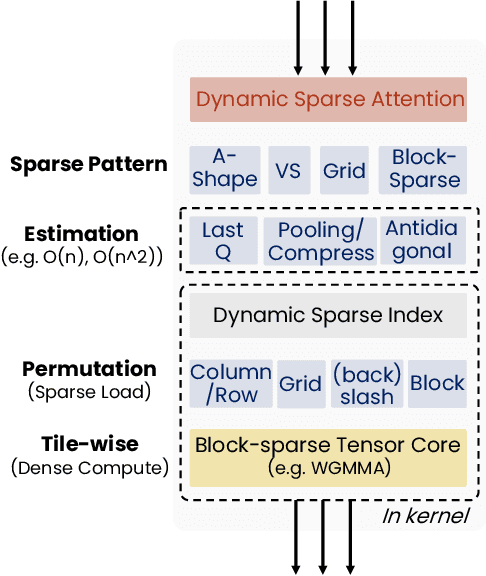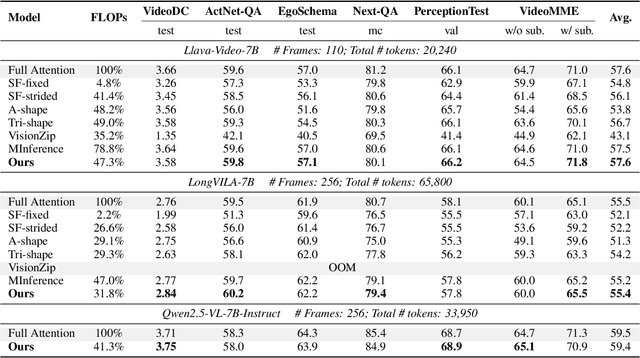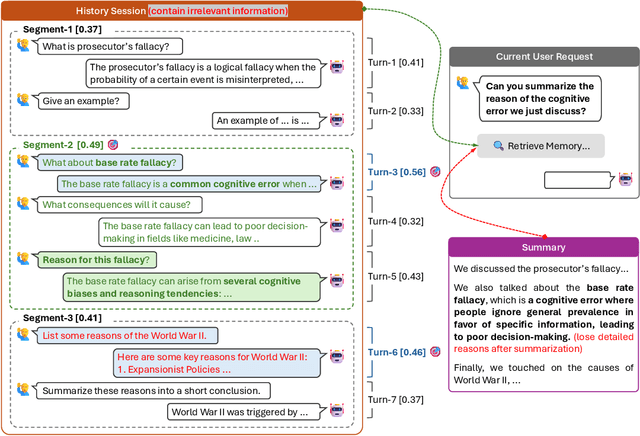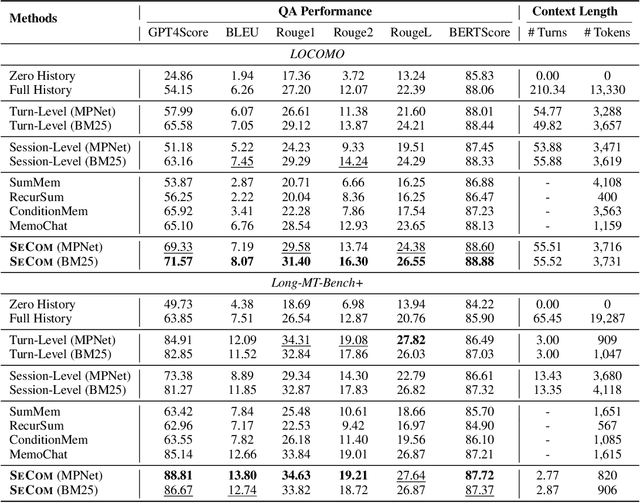Huiqiang Jiang
MTraining: Distributed Dynamic Sparse Attention for Efficient Ultra-Long Context Training
Oct 21, 2025Abstract:The adoption of long context windows has become a standard feature in Large Language Models (LLMs), as extended contexts significantly enhance their capacity for complex reasoning and broaden their applicability across diverse scenarios. Dynamic sparse attention is a promising approach for reducing the computational cost of long-context. However, efficiently training LLMs with dynamic sparse attention on ultra-long contexts-especially in distributed settings-remains a significant challenge, due in large part to worker- and step-level imbalance. This paper introduces MTraining, a novel distributed methodology leveraging dynamic sparse attention to enable efficient training for LLMs with ultra-long contexts. Specifically, MTraining integrates three key components: a dynamic sparse training pattern, balanced sparse ring attention, and hierarchical sparse ring attention. These components are designed to synergistically address the computational imbalance and communication overheads inherent in dynamic sparse attention mechanisms during the training of models with extensive context lengths. We demonstrate the efficacy of MTraining by training Qwen2.5-3B, successfully expanding its context window from 32K to 512K tokens on a cluster of 32 A100 GPUs. Our evaluations on a comprehensive suite of downstream tasks, including RULER, PG-19, InfiniteBench, and Needle In A Haystack, reveal that MTraining achieves up to a 6x higher training throughput while preserving model accuracy. Our code is available at https://github.com/microsoft/MInference/tree/main/MTraining.
SecurityLingua: Efficient Defense of LLM Jailbreak Attacks via Security-Aware Prompt Compression
Jun 15, 2025Abstract:Large language models (LLMs) have achieved widespread adoption across numerous applications. However, many LLMs are vulnerable to malicious attacks even after safety alignment. These attacks typically bypass LLMs' safety guardrails by wrapping the original malicious instructions inside adversarial jailbreaks prompts. Previous research has proposed methods such as adversarial training and prompt rephrasing to mitigate these safety vulnerabilities, but these methods often reduce the utility of LLMs or lead to significant computational overhead and online latency. In this paper, we propose SecurityLingua, an effective and efficient approach to defend LLMs against jailbreak attacks via security-oriented prompt compression. Specifically, we train a prompt compressor designed to discern the "true intention" of the input prompt, with a particular focus on detecting the malicious intentions of adversarial prompts. Then, in addition to the original prompt, the intention is passed via the system prompt to the target LLM to help it identify the true intention of the request. SecurityLingua ensures a consistent user experience by leaving the original input prompt intact while revealing the user's potentially malicious intention and stimulating the built-in safety guardrails of the LLM. Moreover, thanks to prompt compression, SecurityLingua incurs only a negligible overhead and extra token cost compared to all existing defense methods, making it an especially practical solution for LLM defense. Experimental results demonstrate that SecurityLingua can effectively defend against malicious attacks and maintain utility of the LLM with negligible compute and latency overhead. Our code is available at https://aka.ms/SecurityLingua.
Chain-of-Model Learning for Language Model
May 17, 2025Abstract:In this paper, we propose a novel learning paradigm, termed Chain-of-Model (CoM), which incorporates the causal relationship into the hidden states of each layer as a chain style, thereby introducing great scaling efficiency in model training and inference flexibility in deployment. We introduce the concept of Chain-of-Representation (CoR), which formulates the hidden states at each layer as a combination of multiple sub-representations (i.e., chains) at the hidden dimension level. In each layer, each chain from the output representations can only view all of its preceding chains in the input representations. Consequently, the model built upon CoM framework can progressively scale up the model size by increasing the chains based on the previous models (i.e., chains), and offer multiple sub-models at varying sizes for elastic inference by using different chain numbers. Based on this principle, we devise Chain-of-Language-Model (CoLM), which incorporates the idea of CoM into each layer of Transformer architecture. Based on CoLM, we further introduce CoLM-Air by introducing a KV sharing mechanism, that computes all keys and values within the first chain and then shares across all chains. This design demonstrates additional extensibility, such as enabling seamless LM switching, prefilling acceleration and so on. Experimental results demonstrate our CoLM family can achieve comparable performance to the standard Transformer, while simultaneously enabling greater flexiblity, such as progressive scaling to improve training efficiency and offer multiple varying model sizes for elastic inference, paving a a new way toward building language models. Our code will be released in the future at: https://github.com/microsoft/CoLM.
RetroInfer: A Vector-Storage Approach for Scalable Long-Context LLM Inference
May 05, 2025Abstract:The growing context lengths of large language models (LLMs) pose significant challenges for efficient inference, primarily due to GPU memory and bandwidth constraints. We present RetroInfer, a novel system that reconceptualizes the key-value (KV) cache as a vector storage system which exploits the inherent attention sparsity to accelerate long-context LLM inference. At its core is the wave index, an Attention-aWare VEctor index that enables efficient and accurate retrieval of critical tokens through techniques such as tripartite attention approximation, accuracy-bounded attention estimation, and segmented clustering. Complementing this is the wave buffer, which coordinates KV cache placement and overlaps computation and data transfer across GPU and CPU to sustain high throughput. Unlike prior sparsity-based methods that struggle with token selection and hardware coordination, RetroInfer delivers robust performance without compromising model accuracy. Experiments on long-context benchmarks show up to 4.5X speedup over full attention within GPU memory limits and up to 10.5X over sparse attention baselines when KV cache is extended to CPU memory, all while preserving full-attention-level accuracy.
Zoomer: Adaptive Image Focus Optimization for Black-box MLLM
Apr 30, 2025



Abstract:Recent advancements in multimodal large language models (MLLMs) have broadened the scope of vision-language tasks, excelling in applications like image captioning and interactive question-answering. However, these models struggle with accurately processing visual data, particularly in tasks requiring precise object recognition and fine visual details. Stringent token limits often result in the omission of critical information, hampering performance. To address these limitations, we introduce \SysName, a novel visual prompting mechanism designed to enhance MLLM performance while preserving essential visual details within token limits. \SysName features three key innovations: a prompt-aware strategy that dynamically highlights relevant image regions, a spatial-preserving orchestration schema that maintains object integrity, and a budget-aware prompting method that balances global context with crucial visual details. Comprehensive evaluations across multiple datasets demonstrate that \SysName consistently outperforms baseline methods, achieving up to a $26.9\%$ improvement in accuracy while significantly reducing token consumption.
MMInference: Accelerating Pre-filling for Long-Context VLMs via Modality-Aware Permutation Sparse Attention
Apr 22, 2025



Abstract:The integration of long-context capabilities with visual understanding unlocks unprecedented potential for Vision Language Models (VLMs). However, the quadratic attention complexity during the pre-filling phase remains a significant obstacle to real-world deployment. To overcome this limitation, we introduce MMInference (Multimodality Million tokens Inference), a dynamic sparse attention method that accelerates the prefilling stage for long-context multi-modal inputs. First, our analysis reveals that the temporal and spatial locality of video input leads to a unique sparse pattern, the Grid pattern. Simultaneously, VLMs exhibit markedly different sparse distributions across different modalities. We introduce a permutation-based method to leverage the unique Grid pattern and handle modality boundary issues. By offline search the optimal sparse patterns for each head, MMInference constructs the sparse distribution dynamically based on the input. We also provide optimized GPU kernels for efficient sparse computations. Notably, MMInference integrates seamlessly into existing VLM pipelines without any model modifications or fine-tuning. Experiments on multi-modal benchmarks-including Video QA, Captioning, VisionNIAH, and Mixed-Modality NIAH-with state-of-the-art long-context VLMs (LongVila, LlavaVideo, VideoChat-Flash, Qwen2.5-VL) show that MMInference accelerates the pre-filling stage by up to 8.3x at 1M tokens while maintaining accuracy. Our code is available at https://aka.ms/MMInference.
Scaling Up On-Device LLMs via Active-Weight Swapping Between DRAM and Flash
Apr 11, 2025Abstract:Large language models (LLMs) are increasingly being deployed on mobile devices, but the limited DRAM capacity constrains the deployable model size. This paper introduces ActiveFlow, the first LLM inference framework that can achieve adaptive DRAM usage for modern LLMs (not ReLU-based), enabling the scaling up of deployable model sizes. The framework is based on the novel concept of active weight DRAM-flash swapping and incorporates three novel techniques: (1) Cross-layer active weights preloading. It uses the activations from the current layer to predict the active weights of several subsequent layers, enabling computation and data loading to overlap, as well as facilitating large I/O transfers. (2) Sparsity-aware self-distillation. It adjusts the active weights to align with the dense-model output distribution, compensating for approximations introduced by contextual sparsity. (3) Active weight DRAM-flash swapping pipeline. It orchestrates the DRAM space allocation among the hot weight cache, preloaded active weights, and computation-involved weights based on available memory. Results show ActiveFlow achieves the performance-cost Pareto frontier compared to existing efficiency optimization methods.
On Memory Construction and Retrieval for Personalized Conversational Agents
Feb 08, 2025



Abstract:To deliver coherent and personalized experiences in long-term conversations, existing approaches typically perform retrieval augmented response generation by constructing memory banks from conversation history at either the turn-level, session-level, or through summarization techniques. In this paper, we present two key findings: (1) The granularity of memory unit matters: Turn-level, session-level, and summarization-based methods each exhibit limitations in both memory retrieval accuracy and the semantic quality of the retrieved content. (2) Prompt compression methods, such as \textit{LLMLingua-2}, can effectively serve as a denoising mechanism, enhancing memory retrieval accuracy across different granularities. Building on these insights, we propose SeCom, a method that constructs a memory bank with topical segments by introducing a conversation Segmentation model, while performing memory retrieval based on Compressed memory units. Experimental results show that SeCom outperforms turn-level, session-level, and several summarization-based methods on long-term conversation benchmarks such as LOCOMO and Long-MT-Bench+. Additionally, the proposed conversation segmentation method demonstrates superior performance on dialogue segmentation datasets such as DialSeg711, TIAGE, and SuperDialSeg.
SCBench: A KV Cache-Centric Analysis of Long-Context Methods
Dec 13, 2024



Abstract:Long-context LLMs have enabled numerous downstream applications but also introduced significant challenges related to computational and memory efficiency. To address these challenges, optimizations for long-context inference have been developed, centered around the KV cache. However, existing benchmarks often evaluate in single-request, neglecting the full lifecycle of the KV cache in real-world use. This oversight is particularly critical, as KV cache reuse has become widely adopted in LLMs inference frameworks, such as vLLM and SGLang, as well as by LLM providers, including OpenAI, Microsoft, Google, and Anthropic. To address this gap, we introduce SCBench(SharedContextBench), a comprehensive benchmark for evaluating long-context methods from a KV cachecentric perspective: 1) KV cache generation, 2) KV cache compression, 3) KV cache retrieval, 4) KV cache loading. Specifically, SCBench uses test examples with shared context, ranging 12 tasks with two shared context modes, covering four categories of long-context capabilities: string retrieval, semantic retrieval, global information, and multi-task. With it, we provide an extensive KV cache-centric analysis of eight categories long-context solutions, including Gated Linear RNNs, Mamba-Attention hybrids, and efficient methods such as sparse attention, KV cache dropping, quantization, retrieval, loading, and prompt compression. The evaluation is conducted on 8 long-context LLMs. Our findings show that sub-O(n) memory methods suffer in multi-turn scenarios, while sparse encoding with O(n) memory and sub-O(n^2) pre-filling computation perform robustly. Dynamic sparsity yields more expressive KV caches than static patterns, and layer-level sparsity in hybrid architectures reduces memory usage with strong performance. Additionally, we identify attention distribution shift issues in long-generation scenarios. https://aka.ms/SCBench.
RetrievalAttention: Accelerating Long-Context LLM Inference via Vector Retrieval
Sep 16, 2024



Abstract:Transformer-based large Language Models (LLMs) become increasingly important in various domains. However, the quadratic time complexity of attention operation poses a significant challenge for scaling to longer contexts due to the extremely high inference latency and GPU memory consumption for caching key-value (KV) vectors. This paper proposes RetrievalAttention, a training-free approach to accelerate attention computation. To leverage the dynamic sparse property of attention, RetrievalAttention builds approximate nearest neighbor search (ANNS) indexes upon KV vectors in CPU memory and retrieves the most relevant ones via vector search during generation. Due to the out-of-distribution (OOD) between query vectors and key vectors, off-the-shelf ANNS indexes still need to scan O(N) (usually 30% of all keys) data for accurate retrieval, which fails to exploit the high sparsity. RetrievalAttention first identifies the OOD challenge of ANNS-based attention, and addresses it via an attention-aware vector search algorithm that can adapt to queries and only access 1--3% of data, thus achieving a sub-linear time complexity. RetrievalAttention greatly reduces the inference cost of long-context LLM with much lower GPU memory requirements while maintaining the model accuracy. Especially, RetrievalAttention only needs 16GB GPU memory for serving 128K tokens in LLMs with 8B parameters, which is capable of generating one token in 0.188 seconds on a single NVIDIA RTX4090 (24GB).
 Add to Chrome
Add to Chrome Add to Firefox
Add to Firefox Add to Edge
Add to Edge